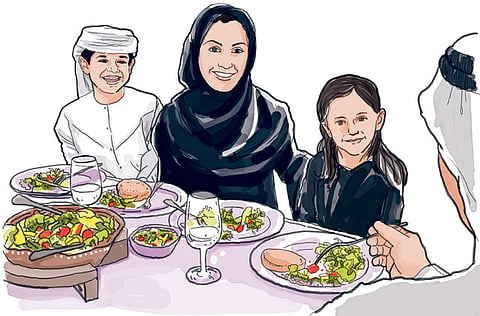Ideal time to exercise self-control
Muslims need to think and closely examine their interaction with their fellow human beings

Ramadan is nearly half way through. Most of us have settled down to our modified lifestyles particularly the fragmented sleeping patterns. The time being spent in prayers and other spiritual activities has increased considerably. However, in all of that an element of physical fatigue has started to emerge.
This is an expected response of the human body as its reserves start to diminish. Let me however put your worries to rest by clarifying that this is a cyclical process: we use up our old stores that we have primarily in our liver and muscles, and replace them with new ones. This is necessary to maintain a healthy body that we normally accomplish that without any problems. However, anyone who is sick is unable to do so and therefore has been asked to refrain from fasting. Spring cleaning for the body is one way to put it.
There have been a lot of questions with regards to what the ideal diet should be during Ramadan. Before we delve into that, our fixation with food is not limited to Ramadan only as you all very well know. I have always been fascinated by the fact that our hospitalised patients are more concerned with what will be served for dinner than what medications are being prescribed to them. All our important occasions, irrespective of whether they are joyous or sad, revolve around food. We have gone to the extent that certain foods have come to symbolise certain occasions. Our choice of food should be as simple as possible. Iftar should focus on consumption of at least some carbohydrates so that the body gets the sugar it needs as soon as possible.
Dates are an excellent source of fibre, magnesium, and potassium in addition to sugar. Therefore they are ideal and highly recommended for iftar. Fortunately, these are the staple for breaking the fast all over the globe. Concomitant to that, fluid replenishment is necessary. Suhoor is a must and should not be missed.
Here, complex carbohydrates should be stressed upon more so than simple carbohydrates. Complex carbohydrates release sugar slowly over time compared to simple carbohydrates and keep the body stocked up with energy during the period of our fast. Simple carbohydrates include table sugar, fruits, milk and milk products and vegetables and are a ready source of energy. Complex carbohydrates include beans, peas, lentils, corn, potatoes, whole-grain bread, cereals, etc.
Health problems
In terms of our food choices, it is always ideal to follow the diet that is reflective of the geographical region that one is residing in at that time. That diet has evolved over ages to reflect what is required for an effective survival in that area. Unfortunately, one of effects of globalisation is the creation of the fast food culture. Obviously, that kind of food intake has led to a host of health related issues. One should stay away from it during the rest of the year in general but more so in Ramadan in particular. In addition to the mushrooming of fast food outlets all over the city, it is also very convenient to have it delivered at home. Why bother wasting a few calories in terms of making the effort in physically going to the store? Unfortunately, this is affecting our younger generation the most with the rate of obesity going through the roof.
In terms of the local diet, our dietitians recommend items such as lentil soup, salad, thareed (meat stew with bread), harees (dish made with wheat and meat), baked fish and rice for iftar. Whereas suhoor should have items like brown bread, fresh fruit, low fat milk, cheese or yogurt. Drink plenty of fluids along with your meals and then try to conserve them as much as you can.
Fried and fatty foods should be kept to a minimum. Excessive intake of salt should be avoided. Focus more on fresh fruits and vegetables. White meat (chicken, fish, turkey, etc) is preferable over red meat. In short, the recommendations remain essentially the same as they are for any healthy diet during our usual routine. As discussed earlier, Ramadan is not an excuse to over-indulge. On the contrary, it is an exercise in self-control.
Finally Ramadan is a time for introspection. As we work hard to replenish ourselves spiritually, we all need to think and look around as to our interactions with our fellow human beings during this month and beyond. In particular, the mad rush that is evident on the roads around iftar defeats the essence of self-control that is the primary message of this blessed month.
This self-control should extend beyond our desires onto our actions during our day-to-day contact with each other. If we all carry this bit of self-restraint beyond this month, that would be the true gift of Ramadan.
Dr M. Hamed Farooqi is the Director of the Dubai Diabetes Centre at the Dubai Health Authority. He is US Board Certified in Internal Medicine as well as Endocrinology and is a Fellow of both the American College of Physicians and Endocrinologists. (This article is the third in a five-part weekly series.)
Sign up for the Daily Briefing
Get the latest news and updates straight to your inbox


